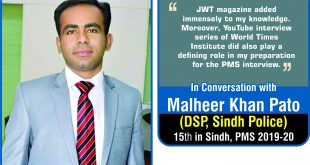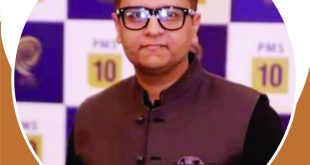 Dr Syed Amer Mahmood is the current chairman of Punjab University’s Space Sciences department. Having earned his PhD in Remote Sensing/GIS from Technische Universität Bergakademie Freiberg, Germany, Dr Amer has a long list of scientific cruises on his credit. His research interests include remote sensing and applications of Geographical Information System (GIS) in the field of natural disaster management, geosciences, earthquakes and seismology, hydrology, geomorphology and geo-tectonic, surface and basin dynamics, drainage and lineament analysis for oil trappings, erosion modelling, river profile and hypsometric analyses, non-linear analysis, atmospheric, climatic and meteorological implications and general applications in urban planning and forest inventory management. In an exclusive conversation with Jahangir’s World Times (JWT), Dr Amer threw light on the prospects of the development of space sciences in Pakistan.
Dr Syed Amer Mahmood is the current chairman of Punjab University’s Space Sciences department. Having earned his PhD in Remote Sensing/GIS from Technische Universität Bergakademie Freiberg, Germany, Dr Amer has a long list of scientific cruises on his credit. His research interests include remote sensing and applications of Geographical Information System (GIS) in the field of natural disaster management, geosciences, earthquakes and seismology, hydrology, geomorphology and geo-tectonic, surface and basin dynamics, drainage and lineament analysis for oil trappings, erosion modelling, river profile and hypsometric analyses, non-linear analysis, atmospheric, climatic and meteorological implications and general applications in urban planning and forest inventory management. In an exclusive conversation with Jahangir’s World Times (JWT), Dr Amer threw light on the prospects of the development of space sciences in Pakistan.
We have to enhance our capabilities in space sciences, especially in the field of advanced satellite communication.
Jahangir’s World Times (JWT): As there is an acute lack of research activities in space sciences in Pakistan, what steps you have taken to provide the students with maximum exposure in this field?
Dr Syed Amer Mahmood (DSAM): As you know space sciences is the study and research of issues specifically related to space flight/ travel and space exploration, so it is a highly sophisticated field of science. You have correctly pointed out that there is an acute paucity of exposure opportunities for the students; however, the situation is changing rapidly. At the Department of Space Sciences of University of the Punjab, we are availing all possible opportunities to ameliorate the situation.
Actually, highly qualified teachers and instructors are the most fundamental requirement to provide the students with practical exposure in this field. Under the kind patronage of and support from Dr Mujahid Kamran, the incumbent Vice-Chancellor of the University of the Punjab, we have inducted two more PhDs in our faculty. One of them is Dr Tayyaba Zafar who did her specialization in Astrophysics from Denmark. Presently, she is a post-doc fellow in the European Southern Observatory based in Germany. The second of them is Dr Ghulam Jaffar who holds a specialization in Satellite Communication from Austria.
JWT: What steps have you taken to promote research activities in this field?
DSAM: Actually, I came back from Germany last year and joined the department as its Chairman. Upon assuming the charge, I was quite disappointed to see that the promotion of research culture was absolutely lacking. So, I assigned certain areas of Space Sciences, like agriculture and forest yield, feasibility of dam sites through satellite eye, disaster management and rescue operations etc., to faculty members of our department. I am highly confident that their strenuous efforts to train the students will develop, and then sharpen, their research skills. Furthermore, we have signed “Pakistan National Students Satellite Programme” with Pakistan Space and Upper Atmosphere Research Commission (SUPARCO). In this joint venture, our students will design receivers to be fixed on board satellites a.k.a. Radiation Dosimeter. The instrument will work like a solar panel that will provide power to certain subsystems of the satellite from the sun and will also regulate the radiation according to the needs of the satellite. We also take our students on regular study visits to the SUPARCO sites in Lahore, Islamabad and Karachi. Moreover, we are writing letters to different government departments in order to have their collaboration for the training of our students.
JWT: Where can the students having a BS or MS degree in Space Sciences apply?
DSAM: The graduates or masters in Space Sciences can apply on various engineering posts, some posts of natural sciences and military sciences too; because they amply know the surveying techniques. They also have a strong background in mathematics and physics, which the students of GIS (Geographical Information System) don’t have.
 JWT: How you will compare PU’s Department of Space Science with that of the NUST?
JWT: How you will compare PU’s Department of Space Science with that of the NUST?
DSAM: Actually, the programme at NUST is USAID-funded. It does also enjoy the support of Pakistan’s armed forces which is good indeed. However, it must be surprising for that the students of our department are working as instructors in NUST’s Department of Remote Sensing. PU’s Department of Space Sciences was established in 1987 and it is, actually, the parent department as far as the field of Space Sciences is concerned in Pakistan.
JWT: What is Remote Sensing and how it is related to disaster management?
DSAM: Remote sensing is actually the science of obtaining information about objects or areas from a distance, typically from aircraft or satellites. It is done by the scanning of earth through satellites or high-flying objects. Now, as regards its relation with disaster management, it is an ideal tool for the purpose since it offers information over large areas, and at short time intervals. It was practically applied after the devastating earthquake that rocked various parts of Pakistan and Azad Jammu & Kashmir in 2005. At first, the SUPARCO took satellite images of the affected area. Then, these were compared with the pre-earthquake images of the same area. It helped the authorities a lot in conducting accurate and rapid rescue operations. And, it is again a matter of pride for our department that the remote sensing unit of SUPARCO has many of our graduates.
JWT: We lag far behind our neighbour India in this field because they have five regional remote sensing service centres but we do not have any. What, in your opinion, is the cause of this negligence on the part of government?
DSAM: It is regrettably true that in comparison to India’s five regional remote sensing service centres, the numbers of such institution in Pakistan is zero. Moreover, their remote sensing programme is more advanced than ours. There are reports that they will soon be launching a meteorological satellite as well. Actually, it is a matter of priorities. We have to choose between Metro and Mars.
JWT: How do you see Pakistan’s space programme in comparison to that of India?
DSAM: Indian Space programme is far ahead of us, as in comparison to them, we stand nowhere. Now, in Space Sciences India is the fourth power in the world after US, Russia and China. Moreover, recently they have sent a highly cost-effective successful mission to Mars. Moreover, they have Satellite Launch Vehicles (SLVs) and also two launching pads. That’s why they are launching foreign satellites. However, we do not have SLVs and for the launch of satellite we are dependent on China. In fact, China and India dominate Asia in space sciences and we are far behind of even Indonesia and Malaysia.
As I said earlier, we ourselves are responsible for this sorry state of affairs because space sciences had never been a priority for the successive governments. Apart from this, the foreign bias is also a major factor in this regard. Since Pakistan is the only Muslim nuclear power, they cannot defeat us but they have been successful in destabilizing our country and in depriving us from the opportunities of development in space sciences.
JWT: Do we have any satellite at present?
DSAM: Yes, we have but only one satellite named Paksat-1 that is a geosynchronous and communication satellite. TV channels we watch through cable system, and networks of cellular companies and services like 3G, 4G all are working because of this communication satellite.
JWT: Today, we have 3G and 4G services available to almost every consumer in Pakistan but the internet speed is not as it should be. Moreover, 3G internet in Saudi Arabia is faster than in Pakistan. What are the reasons behind this problem?
DSAM: I am sure this question would touch the heart of every consumer in Pakistan.
Let me explain this. Suppose, you have a pipe that has the capacity to regulate the flow of only 10 cusecs of water but we want to pass 100 cusecs from that pipe. What will happen? Obviously, it will obstruct the flow. Same is the case with internet speed in Pakistan.
Actually, Pakistan Telecommunication Authority (PTA) is responsible for making rules and regulations to monitor the cellular companies and quality of service they are providing to the consumers through their value-added features like 3G or 4G. Why the cellular companies are given licenses of 3G and 4G services when they don’t have the requisite infrastructure. Consumers do register complaints but all in vain because like many other mafias, the ‘telecom mafia’ is also fleecing the Pakistanis. Let’s see how and when this digital theft ends.
JWT: As you said Pakistan has only one satellite. In your opinion, how many satellites we actually need?
DSAM: We need at least three more satellites: first is a remote sensing satellite which we need for disaster management and earth observation; second is a meteorological satellite which we require for weather forecasting on hourly basis and issue prior warnings for hurricanes, tornados, cyclones, etc. Third is an advanced communication satellite that will help us in navigation and spying for military purposes. To enhance its ability of reconnaissance and prior identification of the targets, the Indian Air Force (IAF) is consistently working on it. In Pakistan, SUPARCO is working on these projects and it has planned to launch three above-mentioned satellites in the coming 3-4 years. Actually, Drone and AWACS technologies, which we have already acquired, are partially productive. We have to enhance our capabilities in space sciences, especially in the field of advanced satellite communication.
 Jahangir's World Times First Comprehensive Magazine for students/teachers of competitive exams and general readers as well.
Jahangir's World Times First Comprehensive Magazine for students/teachers of competitive exams and general readers as well.


